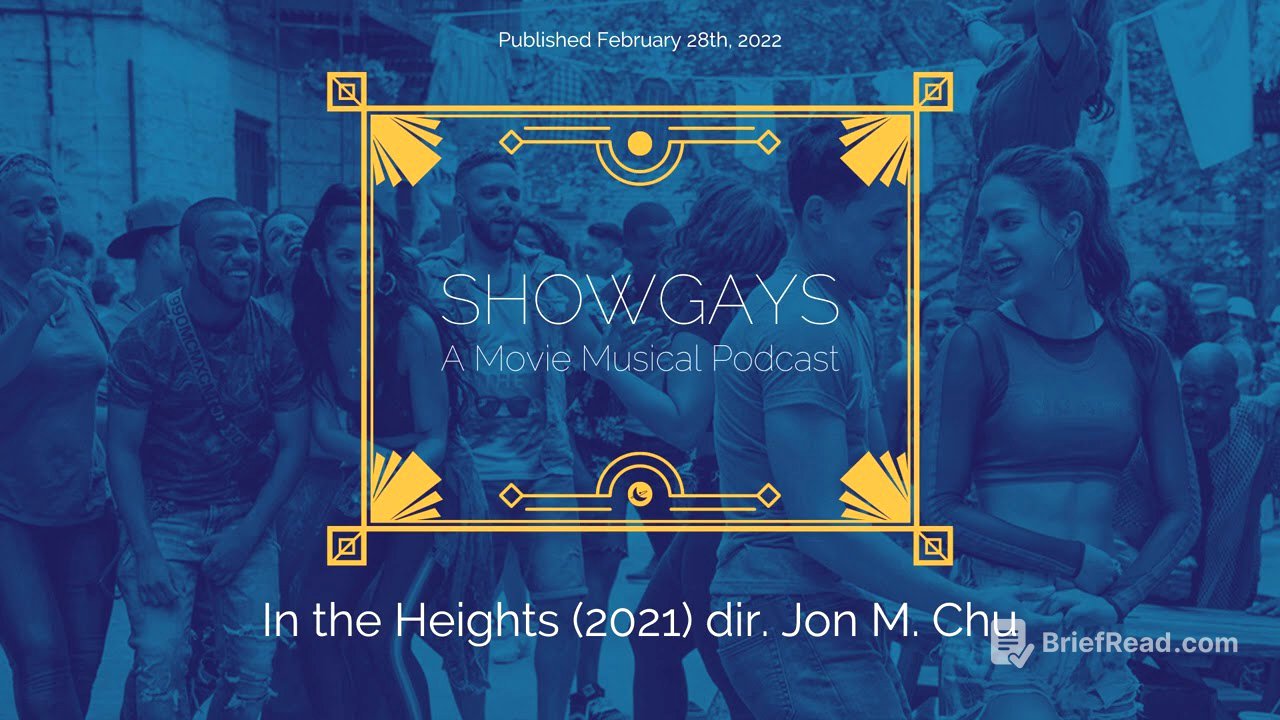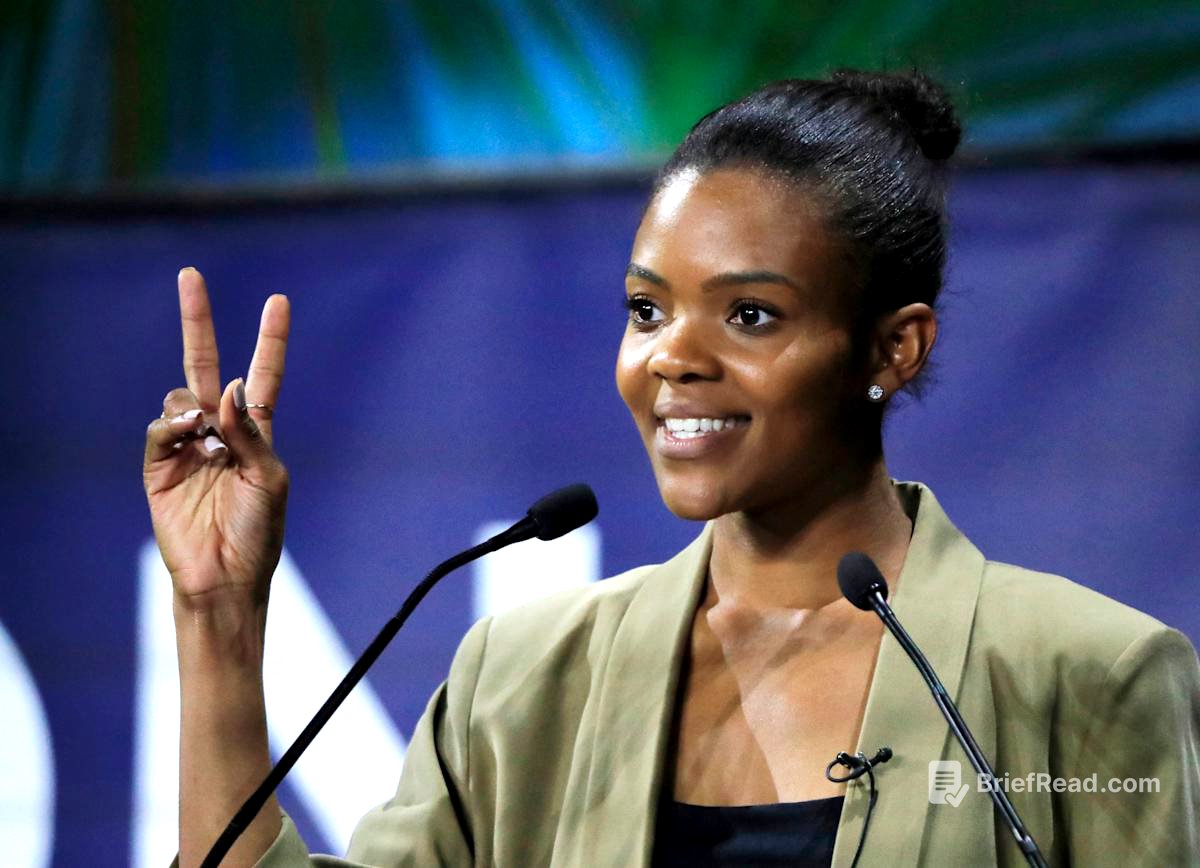TLDR;
This YouTube video features a discussion about the movie "In the Heights," exploring its cultural representation, musicality, and adaptation from the original Broadway show. The hosts share their personal connections to the musical, analyze its themes, and critique its successes and shortcomings. Key points include the film's handling of colorism, the effectiveness of its musical numbers, and the changes made to the plot and characters compared to the stage version.
- Cultural representation and colorism in casting choices.
- Analysis of musical numbers and their effectiveness in conveying themes.
- Comparison of plot and character changes between the movie and the Broadway show.
Salsa on Two [0:07]
The speaker discusses the importance of representing New York style salsa, known as "On Two," which his father helped structure. He emphasizes the diverse Caribbean roots of the dance and the need to represent various cultures, including Dominican, Mexican, and Colombian influences. The speaker also touches on the historical context of salsa, noting its origins in African rhythms preserved by slaves during the Spanish conquest. To teach salsa, instructors demonstrate timing, highlighting the conga's role in dictating the rhythm and breaks.
Asian Heritage [1:22]
The speaker addresses his Asian identity and his fluency in English, explaining the challenges of maintaining his culture while living in America. He encourages listeners to strive for something greater, emphasizing the sacrifices made by their parents for education. The speaker notes the increasing competitiveness among Asians and the pressure to succeed.
Lin-Manuel Miranda [1:54]
The speaker recounts his experience playing a role previously held by Lin-Manuel Miranda on Broadway. He describes Miranda's supportive presence on set, noting that Miranda offered no specific advice but encouraged him to "do your thing" and "tell the truth." The speaker mentions hearing that the role was initially intended for him, even though Miranda wrote it for himself, and expresses gratitude for the opportunity.
Carla Got Done Extremely Dirty [3:40]
The speakers express their dissatisfaction with how the character Daniela (referred to as Carla initially due to a mix-up) was treated in the musical "In the Heights." They feel that Daniela, the salon owner, deserved a better storyline and more recognition. The discussion is postponed until the end of the podcast to avoid spoilers, as Daniela's story arc concludes at the musical's end.
Podcast Intro [4:28]
The hosts introduce another episode of their podcast, acknowledging that their discussions often exceed the actual runtime of the film they are reviewing. One of the hosts, Molly, shares her experiences during the pandemic, noting her limited social interaction and expressing hope for improvement. The hosts also mention a recent disagreement they had, witnessed by Molly, describing it as a typical married couple's spat.
One Minute Summary [6:32]
RJ provides a concise one-minute summary of "In the Heights," describing it as a movie musical about a vibrant Latino community in Washington Heights, New York. The story revolves around Usnavi, who dreams of returning to the Dominican Republic, and Vanessa, who aspires to be a fashion designer. The summary touches on the challenges faced by Nina, who struggles with her identity at Stanford, and the sacrifices made by her father, Kevin. Other characters include Daniela, Carla, and Abuela Claudia, who serves as the community's matriarch. The summary highlights themes of gentrification, DACA, and the pursuit of dreams within the community.
Spoilers [8:35]
The hosts discuss whether to include spoilers for "In the Heights," acknowledging a small twist at the end that some viewers might prefer not knowing. RJ recounts his surprise at the twist during his first viewing. The twist involves the setting of Usnavi's storytelling, which is revealed to be within the bodega in New York rather than on an actual beach in the Dominican Republic.
Personal Relationship to In The Heights [10:39]
A host shares his experience of seeing "In the Heights" on Broadway in 2010, noting that Corbin Blue played Usnavi at the time. He enjoyed the show but did not become deeply attached to the music. Molly recounts RJ's enthusiasm for the album and her lukewarm initial reaction. She remembers a freshman in college performing "Breathe," which she particularly loved. RJ discusses his introduction to the musical through his speech and debate coach, who recommended it for its cadence and immigrant story. He saw a Chicago production of the musical in college and was deeply moved by it.
Background [17:44]
The hosts discuss the background of "In the Heights," noting that Lin-Manuel Miranda wrote the music and lyrics, while Quiara Alegría Hudes wrote the book and screenplay. Miranda was inspired to create the musical after seeing a performance of "Rent" at age 17. He developed the show over several years, premiering it in Connecticut before it moved to Broadway in 2008. The musical won multiple Tony Awards, including Best Musical and Best Original Score.
Cape Man [21:57]
The hosts discuss Lin-Manuel Miranda's motivation for writing a musical with all Latinx characters, referencing a high school production of "West Side Story" and the musical "Cape Man." "Cape Man," a collaboration between Paul Simon and Derek Walcott, told the story of Salvador Agron, a Puerto Rican gang member who killed two teenage boys. The musical was criticized for its simplistic book despite praised songs and choreography. "In the Heights" has had numerous international productions, including in Manila, Panama City, Sao Paulo, and Tokyo.
The Movie [28:21]
The hosts transition to discussing the "In the Heights" movie, directed by Jon M. Chu, with a screenplay by Quiara Alegría Hudes. The film stars Anthony Ramos as Usnavi, Corey Hawkins as Benny, and Leslie Grace as Nina. Produced by Lin-Manuel Miranda and others, it was distributed by Warner Brothers and released on June 10, 2021. The film had a budget of $55 million but grossed only $43.9 million, resulting in a significant loss. The hosts explore potential reasons for the film's commercial failure, including the pandemic, its availability on HBO Max, and its long runtime.
Top Movies [33:47]
The hosts discuss the top five movies during the opening weekend of "In the Heights," noting that "A Quiet Place Part II" was number one, followed by "In the Heights" at number two. Other films in the top five included "The Conjuring: The Devil Made Me Do It," "Peter Rabbit II: The Runaway," and "Cruella." The hosts suggest that the success of horror films and children's movies may have contributed to the lower performance of "In the Heights." They also raise the possibility of racism affecting the film's reception.
History of the Movie [35:53]
The hosts discuss the history of attempts to adapt "In the Heights" into a movie. In 2008, Universal Pictures planned to release a film in 2011, with Kenny Ortega directing and a search for a bankable star like JLo or Shakira. This project did not materialize. In 2016, Lin-Manuel Miranda and Harvey Weinstein announced a co-production, but this also fell through. Warner Brothers eventually won the rights through an auction, creating a Barrio set to impress Miranda. The film received Grammy nominations for Best Soundtrack and a Golden Globe nomination for Anthony Ramos.
Themes [41:46]
The hosts discuss the themes of "In the Heights," noting departures from the original source material. RJ points out that the movie deepens certain characters and storylines, while Molly notes that the romantic relationships feel secondary to the characters' dreams. The hosts debate whether Usnavi and Vanessa's decision to stay in Washington Heights aligns with their established dreams. Adam argues that their dreams evolve to include staying in their community, emphasizing the importance of "little dreams."
Lottery Ticket [48:44]
The hosts discuss the handling of the lottery ticket in the movie versus the musical. In the movie, the lottery ticket is revealed later as a gift for Usnavi after Abuela's death. Molly expresses her frustration with Usnavi's decisions regarding the lottery ticket, such as delaying cashing it and giving it to a lawyer for Sunny's legal case. The hosts agree that these actions create plot holes and undermine the potential payoff of the lottery ticket.
Differences [51:38]
The hosts discuss the key differences between the musical and the movie. The musical emphasizes relationship-based conflicts, while the movie focuses on tangible conflicts like the dreamer situation. The hosts explore the reasons for these changes, suggesting that the inclusion of the dreamer storyline necessitated a reworking of the plot. They also discuss the significance of Sunny receiving all the lottery money in the movie.
Pesciense [1:04:25]
The hosts discuss the song "Paciencia y Fe" and its significance in the movie. RJ describes the song as one of the best-filmed musical numbers in movie history, praising the performance, choreography, and visual decisions. He notes that the song's theme revolves around Abuela's patience and faith, questioning whether she should keep going or if she has done enough. Molly acknowledges the song's visual appeal but notes that it did not resonate with her as strongly.
Visual Representations [1:10:15]
The hosts discuss the visual representations in "In the Heights," praising the magical realism and the way each song has a distinct concept. Molly expresses her dislike for the animation in Vanessa's song and "96,000," finding it cheesy and out of place. Adam defends the fabric visuals in Vanessa's song but agrees that the hand animation in "96,000" is less effective.
Community [1:30:03]
The hosts discuss the sense of community in "In the Heights," highlighting "Carnaval del Barrio" and "In the Heights" as songs that emphasize this theme. They praise the wigography and nail choreography in "In the Heights." Molly notes that the movie's diverse settings make the neighborhood feel large, missing the core feeling of the stage show. Adam suggests that the large number of extras undercuts the idea of a close-knit community.
Colorism [1:38:28]
The hosts discuss the colorism critiques of "In the Heights," noting the absence of Afro-Latino main characters. RJ points out that the movie removes the racial element of Kevin's disapproval of Nina's relationship with Benny, which is present in the musical. Molly expresses surprise that Benny's ethnicity was not explicitly stated in the movie. The hosts speculate on the reasons for these choices, suggesting a focus on other political themes like immigration and gentrification.
Rep Switch [1:45:00]
The hosts discuss the "rep switch," where media about marginalized communities are expected to represent every person's experience. They note that the decision to focus on dreamers and gentrification may have been made before the increased awareness of racial issues following George Floyd's murder. The hosts acknowledge the historical context of colorism in Latin America and the pressure to represent the entire community in one film.
Rosarios [1:52:46]
The hosts praise Jimmy Smits' performance as Kevin Rosario, noting his emotional depth. Molly recounts her emotional reaction to the scene where Nina tells her father she is dropping out of college. The hosts discuss the changes made to Nina's storyline, noting that the movie focuses on her experiences with racism at Stanford rather than financial struggles.
Daniella [2:02:24]
The hosts discuss how Daniella was "done dirty" in the movie, noting that Vanessa takes credit for Daniella co-signing her lease. They also discuss the underrepresentation of the queer relationship between Daniella and Carla, noting that their relationship is only implied and not explicitly explored.
Anthony Ramos [2:07:01]
The hosts praise Anthony Ramos' performance as Usnavi, highlighting his charm and attractiveness. They express disbelief that Vanessa would not be immediately drawn to him. The hosts also mention that Ramos played Usnavi in a Kennedy Center production of "In the Heights," which led to his casting in the movie.
Piragua [2:09:48]
The hosts discuss Lin-Manuel Miranda's cameo as the Piragua Guy, noting that he insisted on playing the role to ensure the character was included in the film. Molly initially disliked the cameo but changed her mind after learning that the Piragua Guy was almost cut from the movie. The hosts express a desire for the Piragua Guy to have been more integrated into the story.
Finale [2:14:11]
The hosts discuss the film's finale, with Molly expressing disappointment that it did not feature a new, full-length song with a large ensemble. She describes her ideal finale as a distinct and memorable musical number.
Critics [2:16:27]
The hosts share critics' opinions of "In the Heights," noting its positive reception and celebration of heritage and community. They also mention criticisms regarding pacing and energy. One critic compared the film to "Fiddler on the Roof," emphasizing the importance of the people within a community rather than the physical space itself.
Real Estate [2:19:31]
The hosts discuss a line in the movie where a realtor states that the rent is "40 times the rent," clarifying that this refers to an annual salary requirement. They note that this detail was not made clear in the movie, leading to confusion.
Magical Realism [2:21:58]
The hosts discuss the magical realism in "In the Heights," proposing alternative concepts for the musical numbers. Molly suggests that Vanessa's song could have featured her transforming people on the street into her designs. Adam suggests that "When You're Home" could have incorporated ambient sounds or been cut altogether. RJ suggests including the song "Alabanza" to enhance the community aspect.









